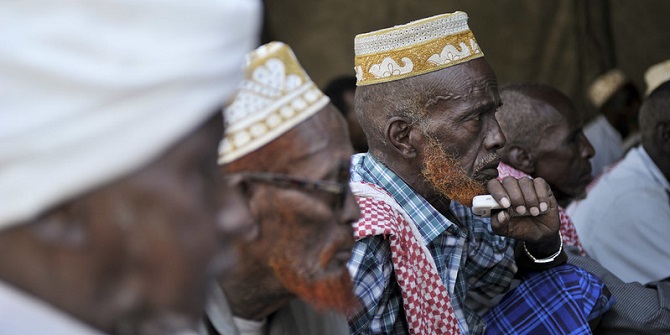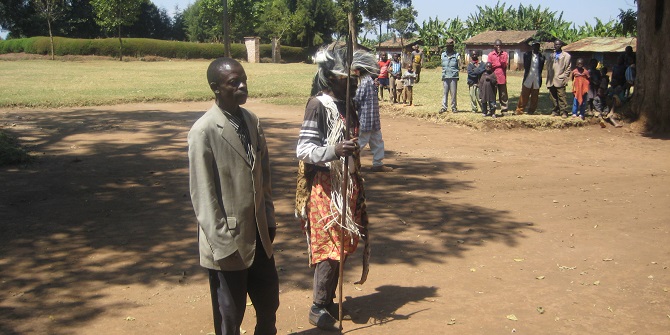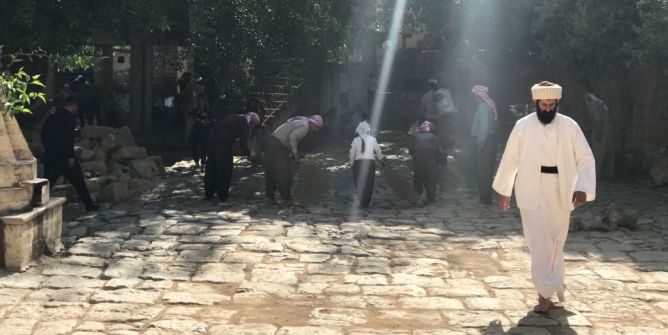A major finding of the Conflict Research Programme is that systemic corruption, a form of transactional politics we call the ‘political marketplace’, tends to be associated with exclusivist identity politics (racism, ethnic nationalism or religious fundamentalism). They are almost always found together, even though they often operate in contradictory ways. In a special issue of the journal Conflict, Security & Development, titled ‘Identity, Violence, and the Political Marketplace’ edited by Mary Kaldor, Alex de Waal and Henry Radice, researchers from across the CRP present new research that explores the logics of organised violence, identity formation, war economies and political markets in the five countries of focus for the programme: the Democratic Republic of the Congo, Iraq, Somalia, South Sudan and Syria.

Concepts and Conclusions
An introductory paper by Mary Kaldor and Alex de Waal, ‘Identity formation and the political marketplace’, provides an analytic overview of the core concepts and an outline of how they intersect, in the specific contexts of our research countries. They note two key features of contemporary politics discernible in each of the CRP’s five sites. The first is that of the political market, in which power itself – public office, political allegiances and political services – is bought and sold according to the laws of supply and demand. The second is the increasing salience of political narratives that are framed around singular, binary and fixed identities, or, as shorthand, ‘exclusivist identities’.
Kaldor and de Waal set out three core propositions about the relationship between identity politics and the political marketplace, drawing on the special issue’s case studies for evidentiary support.
- Contemporary conflicts are characterised by a specific type of fragmented political identities that are exclusivist, singular and make a claim to be fixed; a claim often endorsed by international interventions, with the consequence of making them more rigid. These are forms of identity that tend to be associated with steep gender hierarchies. These fragmentary identity politics are constructed primarily through violence. Where other forms of construction are more salient – education or media, for example – there are greater possibilities for pluralism and fluidity. Violence dramatically upends power relations and constructs new asymmetries of power, based on a combination of both its material and identity capital gains.
- Contemporary conflicts are associated with what could be called the ‘disassembled state’, following Saskia Sassen.1 The disassembly of the state is the consequence of both the functioning of the political marketplace, especially the instrumentalisation of different state functions in pursuit of power and material resources, and the fragmentation of identity. This happens as both transactional and identity politics trump rational-legal institutions and social norms. As a result, contemporary wars should be seen as wars of disassembly rather than of state-building.
- External mediation and intervention fixes the relationship between fragmented identities and the subunits of states that emerge from state disassembly. Contemporary peace agreements typically do not end violence; rather they tend to provide a legalistic veneer to a newly established set of power relations, based on the combination of disassembled political units, fragmented identity and crony capitalist networks. These provide the core components of the social condition that characterises contemporary conflict. While normatively fixed, this configuration is constantly unstable – a ‘political unsettlement’ in the words of Christine Bell and Jan Pospisil.2
Civic actors in these conflict contexts are all aware of the pernicious implications arising from the intersection of the political marketplace and identity politics. In recent years, the slogans of democracy protesters in DRC, Sudan and Syria clearly show an awareness that they are ranged against a toxic combination of corruption and the instrumentalisations of identity. Meanwhile, certain political entrepreneurs and particular forms of political organisation thrive under these conditions of turbulence and uncertainty. The body of work offered by the CRP on this topic provides not only an insight into these realities and an agenda for urgent research, but also a vocabulary and diagnostic for civic activists who are pressing for alternatives to their current predicament.
Case studies
In ‘Violent conflict and ethnicity in the Congo: beyond materialism, primordialism and symbolism’, Kasper Hoffmann, Koen Vlassenroot, Tatiana Carayannis and Godefroid Muzalia argue that ethnicity is a defining political resource both in the Congo’s politics and violent conflicts. The high political value of this ethnic capital is sustained by engrained discourses and practices of ethnicity. These permeate the Congo’s political order, shape people’s understanding of politics, conflict and political identities, and have contributed to the formation of an unstable, centrifugal, and fragmentary political order. Conceptualising ethnicity as capital dismantles the artificial dualism between the symbolic realm of identities and the material realm of the economy and suggests that what is at stake in this competition is the distribution of symbolic and material resources. Hoffmann summarises some of these arguments in his blog ‘Ethnogovernmentality: The colonial legacy of the nexus between ethnicity, territory and conflict‘.
Alex de Waal’s article on Somalia, ‘Somalia’s disassembled state: clan unit formation and the political marketplace’, describes the trajectory from an aspiring modernist state, associated with a Somali national identity, to a thoroughly ‘disassembled’ state driven by the twin processes of identity unit formation and penetration of the political marketplace. As in the Congo case, identity formation has its roots both in the colonial period and in the way that a failing modernist state transformed some specific lineage formations, commonly called ‘clans’, ‘into brokers of patronage, coopting them into [the] kleptocracy, and playing them off against each other.’ But it was the violence of the 1987–92 period through which a ‘traumatic and accelerated identity formation’ was produced, both by regime and rebel strategies, that consolidated them as fixed territorial and political units. External efforts both invented and rigidified the newly established divisions. In a recent blog, ‘Somalia’s Disassembled State’, de Waal unpacks the implications of his analysis for the current political impasse in Somalia.
Naomi Pendle illustrates the uneasy relation between the political marketplace and fragmented identity in South Sudan. Her piece, ‘The “Nuer of Dinka money” and the demands of the dead: contesting the moral limits of monetised politics in South Sudan’ includes both the story of the ‘Nuer weu’ and the debates about the meaning of money among the Nuer. Pendle critiques explanations of South Sudan’s armed conflicts since 2013 that have relied on over-simplified theories of identity or monetised politics. She explores the renegotiation of the meanings of monetary exchanges in politics and the interlinked remaking of political identities. The remaking of identity and the moral limits of monetary gifts in politics cannot only mobilise forces to war but also have implications for the moral limits of peace.
The article by Sami Hadaya, ‘Sectarianisation in Syria: the disintegration of a popular struggle’, describes the step-by-step process of sectarianisation in the first few years of the Syrian conflict. It involved rhetorical manipulation – the spread of rumours and the discourse of fear through media as well as religious leaders and local notables. More importantly, sectarianisation was ‘reified’ through the practice of violence – targeting of Sunni areas by the regime, the establishment of ethnic militias, encouragement to loot selectively, and the deliberate release from prison of Salafist fighters. External states and private donors further contributed to sectarian polarisation. The article quotes a woman from Harasta: ‘When they saw they might receive money, they changed their names, their appearance, their symbols, and speech’.
Zeynep Kaya addresses the gender dimension of the relationship between the political marketplace and identity formation in ‘Sexual violence, identity and gender: ISIS and the Yezidis’. She makes the critical argument that gender is a constitutive component of violence and not tangential. She shows how gender norms are an essential part of singular and exclusive identity formation using the extreme example of ISIS and its treatment of Yazidi women. In the ISIS narrative, sexual slavery of the ‘other’ is justified since ‘the other’ (non-Muslims and non-People of the Book) are considered as ‘devil-worshippers’ or ‘mushrik’ (people who date from the period of ignorance about Islam). The construction of identity through sexual violence took place within a socio-economic and political context and long-term history, wherein gender and identity-based hierarchies intersected. This was possible because of the existing repertoires of values, perceptions and practices of hegemonic and militant masculinity. Some of these ideas are explored in Kaya’s blog ‘Coming to the verge of destruction: Survival, change and engagement in the Yazidi community‘.
Finally, Jessica Watkins’ article, ‘Identity politics, elites and omnibalancing: reassessing Arab Gulf state interventions in the Uprisings from the inside out’, points to the transnational character of the relationship between the political marketplace and fragmented identity formation. She provides a critique of the framings of regional relations in terms of ‘geo-sectarianism’ or an ‘Arab Cold War’, suggesting that regional behaviour should be explained in terms of calculations based upon a complex combination of domestic and regional identity-based threats and opportunities related to the uprisings. The three critiques of the ‘geo-sectarian’ narrative is outlined in Watkins’ latest blog ‘Identity Politics, Elites and Omnibalancing: Reassessing Arab Gulf State Interventions in the Uprisings‘.
1 See https://press.princeton.edu/books/paperback/9780691136455/territory-authority-rights
Note: The CRP blogs gives the views of the author, not the position of the Conflict Research Programme, the London School of Economics and Political Science, or the UK Government.





